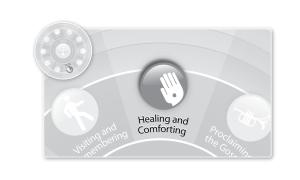The following is a written preview of our new Q&A style podcast where Pastor Foley takes questions related to the Whole Life Offering discipleship training model. Subscribe now!
 Q: So we’re going to work on our prayer life as being a key part of Healing and Comforting as well as the other Works of Mercy; this fits heavily into the Works of Piety, doesn’t it?
Q: So we’re going to work on our prayer life as being a key part of Healing and Comforting as well as the other Works of Mercy; this fits heavily into the Works of Piety, doesn’t it?
A: Yes. Every month there’s a prayer focus to what we do. In Healing and Comforting, it is really key because we know the association between prayer and healing and, as we’ve talked about, we know the connection between confession and healing.
Confession is a form of prayer that God gives us as a means of grace that allows us to experience healing, whether or not we’re ever healed physically. We have some real opportunity to practice our prayer this month. We need to do that by doing things like praying the hours – whether it’s every hour or three times a day or whatever. We don’t do it because we want to fall into legalism. That’s always what Christians worry about: “I don’t want to do anything that looks like discipline because I might fall into legalism.” My response is, “You don’t have to worry about it.”
If people exercised the way they practiced spiritual disciplines they would never lose weight; they would never become healthy. We eat at certain times during the day, but we don’t fall into legalism. Amazingly, we still enjoy the food. So we can distinguish between legalistic aspects of prayer and being disciplined to say, “I’m going to pray at these certain times because it is going to force me to turn my attention to God and outside of my own navel-gazing.” That’s going to be very helpful to be able grow us to fullness in Christ.
Q: You’ve blogged a lot about James 5:13-18 during this series. But I wanted to share verses 19 and 20 because that seems like a piece that brings a lot of this together. It says, “My brothers if anyone among you wanders from the truth and someone brings him back, let him know that whoever brings back a sinner from his wandering will save his soul from death and will cover a multitude of sins.”
So it seems like the things we talked about in terms of prayer and confession are all ways that we would help people keep from wandering from the truth and keep from wandering ourselves. Is that true?
A: This is such a key point. It’s considered accepted behavior today that people can wander away from God and say, “I did it because he wasn’t there when ______,” as if God has to come and say to us, “I am so sorry.” That posture is so radically unbiblical because it portrays a God who doesn’t care unless we bring something to his attention and really put a lot of effort into getting him involved. You do not see that when you hear Jesus talking about his father. What you hear when Jesus talks about his father, and even when Paul talks about the Lord, is “Look, in the past God overlooked that time of ignorance. But he has appointed a man to judge.”
We don’t shake our fist at God about not being there when __________.
We have to say, “I have wandered away from a good God who created me and had good intentions and purpose for my life and has always supplied for me. I have wantonly disregarded that provision.” Tools like confession are really important because they remind us that God doesn’t come to us and apologize for neglecting us as if he were an erring father. We come to God and we confess our sin and say, “You are a good father. You provided for me. I was the one who disregarded that. I only worshipped you when I got what I wanted and, yet, when I got what I wanted, it didn’t turn out to be what I needed anyway. I’m turning my life over to you.”
That’s what confession, Healing and Comforting, that’s even what illness can do. God uses all of those things as a way of reminding us not that he is around the corner if we need him, but that he is always present and it is us who fail to see his presence and draw upon his provision even in times of illness.










